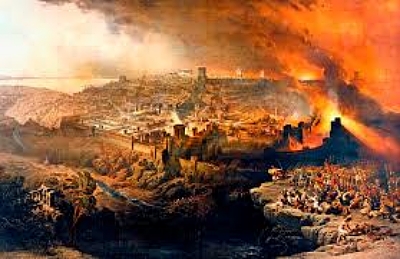Readers,
Have you ever looked closely at the first gospel message preached? Maybe you should. You will find it in the second chapter of Acts.
With that in mind, this study reaches into Peter’s sermon to learn what the gospel is truly about. When Peter completes his message, three thousand new Jewish believers will be added to the Church. Let us see why
Pentecost has come
vs1: “When the day of Pentecost had come, they were all together in one place.”
All the followers of Jesus would be in the temple area for this day. The new covenant must begin at the temple. Listen carefully to this prophecy of Isaiah and you will see Pentecost, and the promise that Peter refers to later in his message of Pentecost:
“‘So they will fear the name of the Lord from the west and His glory from the rising of the sun, for He will come like a rushing stream which the wind of the Lord drives. A Redeemer will come to Zion, and to those who turn from transgression in Jacob,” declares the Lord. ‘
“As for Me, this is My covenant with them,’ says the Lord: ‘My Spirit which is upon you, and My words which I have put in your mouth shall not depart from your mouth, nor from the mouth of your offspring, nor from the mouth of your offspring’s offspring,’ says the Lord, ‘from now and forever.'” (Isaiah 59:19-21)
Every word in this prophecy is significant. Let’s break it down. Follow closely:
“So they will fear the name of the Lord from the west and His glory from the rising of the sun.”
Christianity has filled the earth like a vine. It is the largest religion by far of any religion on this planet. And it continues to flow forth as a stream into the nations.
“…for He will come like a rushing stream which the wind of the Lord drives.”
Written 750 years before Christ. Notice the wordage; “rushing stream,” and “wind of the Lord.”
Also note, “He will come.” This speaks of God’s Messiah. His Spirit will fill the band of disciples on the day of Pentecost. Paul later speaks for all believers; “Because you are sons, God has sent for the Spirit of His Son into our hearts, crying, ‘Abba! Father!'” (Gal4:6)
“Born Again” Day
The term ‘born again,’ or ‘gennao anothen’ means, ‘born from above.’ When the Spirit of Messiah entered into the hearts of the disciples, they instantly became new creations. They were now the new people of God. The Spirit of Christ would abide in them and with them forever.
“A Redeemer will come to Zion and to those who turn from transgression in Jacob…” Zion was a special name for the city of David and in particular for the temple Mount. The Spirit of the Redeemer rushed to the temple mount.
Listen again: “…this is My covenant with them … My Spirit which is upon you [Jesus Christ], and My words which I have put in your mouth shall not depart from your mouth, nor from the mouth of your offspring, nor from the mouth of your offspring’s offspring … from now and forever.”
This is the covenant promise given to Messiah. And this is the promise Peter later quotes when he speaks from the prophets.
Jesus Himself said, “He who believes in Me, as the Scripture said, ‘From his innermost being will flow rivers of living water.’ But this He spoke of the Spirit, whom those who believed in Him were to receive; for the Spirit was not yet given, because Jesus was not yet glorified.” (John 7:38, 39)
Jesus had to be glorified. That is exactly what the day of Pentecost was about. Pentecost is the day that Jesus took His place at the right hand of the Father.
Back to Acts.
Vs2: “…it filled the whole house where they were sitting.” The disciples were in the temple area. To the Jews, when you said ‘the House’ no further identification was needed. It meant the temple.
Notice it was ‘the whole house’ that was filled with the sound from heaven. This was not something done in a corner. Just as the giving of the Law of Moses carried its manifestations, even so did the new covenant.
Vs3: “…there appeared to them tongues as of fire distributing themselves, and they rested on each one of them.”
But what did ‘tongues of fire’ mean?
The Meaning of Fire
In the Bible, fire has various meanings. One meaning refers to judgment. It had to do with God’s very presence. The tongues of fire signified that God Himself was resting upon these disciples. Peter’s message included both promise and judgment.
This meant that each of the disciples had become an anointed spokesmen for God.
What of prophecy? — In the new covenant, the term ‘ to prophesy’ usually carries a different meaning than it did in the older covenant.
In the former covenant, the prophets spoke towards the cross. In the new covenant, we speak from the finished work of the cross.
The one definition we have for prophecy in the New Testament, connects it directly with the testimony of Jesus Christ.
When John wanted to worship the angel, this is what he hears; “Do not do that; I am a fellow servant of yours and of your brethren who hold the testimony of Jesus; worship God. For the testimony of Jesus Christ is the spirit of prophecy.“ (Rev19:20)
Back to Acts 2:
Vs4: “And they were all filled with the Holy Spirit and began to speak with other [languages] as the Spirit was giving them utterance.”
The Greek word ‘glossa’ simply means a language. The disciples were not speaking gibberish. While the languages were not necessarily known to the believers themselves, the Spirit was enabling them to speak in the languages of all the nations that were represented.
The Diaspora [Jews from many nations]
Vss5, 6: “Now there were Jews living in Jerusalem, devout men from every nation from under heaven …each one of them was hearing them speak in his own language”
“Living in Jerusalem” spoke of the Jews who had been in Jerusalem since before Passover. These men were deeply devoted to God and to the covenant of Israel.
Vss7, 8: “…amazed … astonished … ‘Why, are not all these who are speaking Galileans? And how is it that we each hear them in our own language to which we were born?'”
How did they know all the speakers were Galilean? It is because the Galileans spoke with an accent that distinguished them from the Judeans. Judas Iscariot was the only disciple who was Judean. The rest were all Galileans.
The Galileans also had another trait. They were fiercely independent. They did not always agree with the edicts of the temple priesthood. Even the synagogues in northern Israel had traditions that were separate from the Judean synagogues. And the Galileans were looked down upon by the rest of the Jews.
Vss12, 13: “…they all continued in amazement … ‘What does this mean?’ But others were mocking, saying to one another, ‘They are full of sweet wine.'”
It is here that we begin to see the dividing line in Israel. The old prophet Simeon said that the child Jesus was appointed for the fall and rise of many in Israel, and for a sign to be opposed. (Cf. Luke 2:34-35)
Vss14, 15: Peter takes his stand –
Everyone’s attention is now fixed on the one hundred followers of Jesus Christ, prophesying. Now it shifts to the twelve apostles. God has something clear and distinct to say to all Jewish people.
“Men of Judea and all you who live in Jerusalem, let this be known to you and give heed to my words.”
The temple mount quietens down. It is very likely that even a number of priests are giving attention. Many of them will become believers.
“These men are not drunk as you suppose.”
Peter is not comparing states of drunkenness. He is simply saying that these men are not drunk.
Vs16: “…but this is what was spoken of through the prophet Joel:”
Peter begin with the prophets –
Here is where we need understanding. Peter’s entire sermon is going to center on quotations from the prophets. There was no New Testament.
Did you know that we are to preach the Jesus of the prophets. Even when we preach from the apostolic writings, we should never preach in a way that would violate the prophetic writings.
Listen to one of the last conversations Jesus had with the disciples:
“Now He said to them, ‘These are my words which I spoke to you while I was still with you, that all things which are written about me in the Law of Moses and the Prophets and the Psalms must be fulfilled.’
“Then He opened their minds to understand the Scriptures, and He said to them, ‘Thus it is written, that the Christ would suffer and rise again from the dead the third day, and that repentance for forgiveness of sins would be proclaimed in His name to all the nations, beginning from Jerusalem. You are witnesses of these things.'” (Luke 24:44-48)
All the prophetic utterances Peter quotes from are well known to the Jews. The Jewish peoples had commonly accepted these quotes as belonging to Messiah. Peter was speaking to their own faith in promises given ages ago.
Vs17: “‘And it shall be in the last days,’ God says, ‘That I will pour forth OF MY SPIRIT on all mankind; and your sons and your daughters shall prophesy, and your young men shall see visions, and your old men shall dream dreams.'”
Acts2:18; “Even on My bondslaves, both men and women, I will in those days pour forth of My Spirit and they shall prophesy.”
The testimony continues.
Vss19,20; “And I will grant wonders in the sky above and signs on the earth below, blood, and fire, and vapor of smoke. The sun will be turned to darkness and the moon into blood, before the great and glorious day of the Lord shall come.”
Vs21: “And it shall be that everyone who calls on the name of the Lord will be saved.”
This theme of ‘everyone who calls on the name of the Lord will be saved’, will carry over into all the apostolic preaching. Paul uses these very words as he later explains the message they were given to preach.
Listen to Paul:
“But what does it say? ‘The word is the near you, in your mouth and in your heart’ — that is, the word of faith WHICH WE ARE PREACHING, that if you confess with your mouth Jesus as Lord, and believe in your heart that God raised Him from the dead, you will be saved; for with the heart a person believes, resulting in righteousness, and with the mouth he confesses, resulting in salvation.
“For the Scripture says, ‘Whoever believes in Him will not be disappointed.’ For there is no distinction between Jew and Greek; for the same Lord is Lord of all, abounding in riches for all who call on Him; for ‘WHOEVER WILL CALL ON THE NAME OF THE LORD WILL BE SAVED.'” (Rom10:8-13)
Peter continues:
Vs22: “Men of Israel, listen to these words; Jesus the Nazarene, a man attested to you by God with miracles and wonders and signs which God performed through Him … JUST AS YOU YOURSELVES KNOW.“
The ministry of Jesus Christ was well known by all the peoples, in not only the land of Israel, but also word had spread about Him to Jews outside the land, and even to Gentiles in various places. Remember the Greeks who wanted to see Jesus? (Cf. John 12:21)
Vs23: “…this man, delivered over by the predetermined plan and foreknowledge of God, you nailed to a cross by the hands of godless men, and put Him to death.”
The Cross-Was God’s Plan
The cross was God’s plan. Notice that Peter says the Jews nailed Him to the cross by the hands of Gentiles. This means that both Jew and Gentile participated in the cross.
Perhaps it is better to say that God provided the sacrifice. The story of God’s sacrifice Lamb is written across the pages of His holy book.
Vs24: “But God raised Him up again … it was impossible for Him to be held in its [deaths] power.”
Vs25-28: “For David says of Him, ‘I saw the Lord always in my presence; for He is at my right hand, so that I will not be shaken.’ … You will not abandon my soul to hades … You will make me full of gladness with your presence.'”
This is an interesting prophecy. David speaks both of His experience and knowledge of God’s Christ. It is the Spirit of Christ in him speaks prophetically concerning the cross.
During the time of Christ, the three most popular books among the Jewish people were Deuteronomy, Psalms, and Isaiah. These books often spoke of God’s Messiah.
Vss29-31: Peter explains. “Because he [David] was a prophet and knew that God had sworn to him with an oath to seat one of his descendants on his throne. … He looked ahead and spoke of the resurrection of Christ…”
Vs32: “This Jesus God raised up again, to which we are all witnesses.”
This testimony of the chosen apostles as witnesses, would lay the foundation for New Testament writings.
Vs33: “Therefore having been exalted to the right hand of God … He has poured forth this which you both see and hear.”
Coronation Day
The events of the day of Pentecost took place because Jesus had taken His place at the right hand of the Father, and had received His kingdom. This is why Pentecost can be spoken of as the coronation day of Christ.
Vs34: “For it was not David who ascended into heaven, but he himself says: ‘The Lord said to my Lord, “Sit at My right hand, until I make Your enemies a footstool for Your feet.”‘
It was well accepted by the Jews in that time that Psalm 110 was about the Messiah. The importance of this particular prophecy cannot be overstated. Jesus quotes it and the apostles quote it.
Vs36: “This Jesus God raised up again … Therefore let all the house of Israel know for certain that God has made Him both Lord and Christ–this Jesus whom you crucified.”
What was the house of Israel to know? That God has made Jesus both Lord and Christ. It is this message that begins to prick the hearts of those listening. Many will turn to Jesus. Some will hesitate. Others will turn away.
A Piercing Message
Vs37; “Now when they heard this, they were pierced to the heart, and said to Peter and the rest of the apostles, ‘Brethren, what shall we do?'”
We need to remember that while the gospel is a message of life, it is first a piercing message. It is designed to expose the heart, and to render the lost person with no cover for his sins. Remember what Simeon said to Mary?
“Behold, this Child is appointed for the fall and rise of many in Israel, and for a sign to be opposed–and a sword will pierce even your own soul– to the end that thoughts from many hearts may be revealed.” (Luke 2:34, 35)
Simeon was simply saying, ‘And you, Mary, are not excluded from the sword.’ The revealing of thoughts has to do with God’s gospel doing a work of searching out our whole being.
This is where we need to understand the word ‘conviction.’
Jesus said,
“And He, when He comes, will convict the world concerning sin and righteousness and judgment; concerning sin, because they do not believe in Me; and concerning righteousness, because I go to the Father and you no longer see Me; and concerning judgment, because the ruler of this world has been judged.” (John 16:8-11)
The word ‘convict’, elegcho in Greek, speaks of a judicial verdict where we are found guilty with no defense to hide behind. It carries the thought of a moral conquest of the mind.
This is what the gospel is designed to do in the heart of a sinner. Thus we hear these Jewish peoples from all the lands begin to cry out, “What shall we do!”
The Call of Repentance
Vs38: “Peter said to them, ‘Repent, and each of you be baptized in the name of Jesus Christ for the forgiveness of your sins; and you will receive the gift of the Holy Spirit.'”
‘Repent,’ (metanoeo) means to change one’s mind or purpose. Couple it with the Hebrew word ‘nacham’, which means to be sorry, or to suffer grief, then you have the idea behind Biblical repentance. Biblical repentance is to have sorrow over sin, which results in a change of life direction.
The interesting thing about repentance is that the ancient Hebrews also considered repentance as a form of worship. For the righteous man it meant to make continual course adjustments in order to keep on a path of righteousness.
Be Baptized in the Name of …
…. each of you be baptized in the name of Jesus Christ for the forgiveness of your sins…”
Behind this statement is the issue of receiving Jesus Christ as Lord and Messiah of Israel, and in doing this their sins have already been forgiven. The command to repent is an active imperative. It means ‘do it now!’ The “each of you” makes it very personal.
“Be baptized in the name of Jesus Christ.”
In early Jewish baptisms, the person would baptize themselves with witnesses standing by. The believer would express his faith by calling upon the name of the Lord. We see this when Paul was baptized. Ananias said to him, “Now why do you delay? Get up and be baptized, and wash away your sins, calling on His name.” (Acts 22:16)
An Unconditional Promise
… and you will receive the gift of the Holy Spirit.”
“Will receive” is the Greek word ‘lambano’ that means to take into possession. In their turning to the Lord in baptism, they will be the recipients of the covenant Spirit. Peter meant this in the sense of new covenant salvation. Receiving the Spirit takes place in salvation. It is not something that takes place further down the road.
Vs39: “For the promise is for you and your children and for all who are far off, as many as the Lord our God will call to Himself.”
Peter is still going with the prophets.
Vs40: “And with many other words he solemnly testified and kept on exhorting them, saying, ‘Be saved from this perverse generation!'”
Peter has told them what they must do to be saved, but God has more to say to the people. The statement, ‘be saved from this perverse generation‘ is very important to the message of Pentecost.
The Song of Moses
Peter is drawing from Moses. As a prophet, Moses spoke across the ages. In the song of Moses, we have the history of Israel laid out.
I want to highlight a couple parts of the song of Moses, so you will see where Peter is coming from. And when Revelation speaks of the Song of Moses and the Lamb, this is the song in view.
Found in Deuteronomy 32:
Vs1: “Give ear, O heavens, and let me speak…” (Moses is prophesying over Israel by the Spirit.)
Vs4: “The Rock! His work is perfect, for all His ways are just…”
The Rock was one of God’s Old Testament names. When Jesus used ‘this Rock‘ expression, his Jewish apostles knew exactly what He meant. “Upon this Rock I will build My Church.” Peter was not the rock. That would make Peter God. Jesus Christ is the Rock. He is God with us.
Vs5: “They have acted corruptly toward Him, they are not His children, because of their defect; but are a perverse and crooked generation.”
Did you catch it? The rejecters of God’s Messiah have acted corruptly towards Him. When Peter spoke by the Spirit, he was telling the crowd to escape from the Christ rejecters.
Also, notice Moses says, “They are not His children.” The children of God are only those who receive Jesus Christ. This is important to understand. No Jew will be saved because he or she is a Jew. Jesus said to them, “Unless you believe I am He, you will did in your sins.“
You may want to take time to meditate on the song of Moses.
3000 Added in One Day
Vs41: “So then, those who had received his word were baptized; and that day there were added about three thousand souls.”
Can you imagine the activity on the temple mount that day? Peoples were lined up at the mikvehs for baptism. The apostles and others of the one hundred twenty original believers were bearing witness.
Three thousand souls added in one day! This would bring the company of believers upward to four thousand Jewish folk. Remember that Jesus had appeared to over five hundred believers during His forty days on earth.
An Overflow of Pentecost
Vss43-47: “Everyone kept feeling a sense of awe; and many wonders and signs were taking place through the apostles. And all those who had believed were together and had all things in common; and they began selling their property and possessions and were sharing them with all, as anyone might have need.”
This is a very Jewish thing. The new believers are enjoined with a sense of expectation they had never before known. It is likely that they expected Jesus to return at any time.
“Day by day continuing with one mind in the temple …”
The temple area continues to be the center of activity. At this point, there is no resistance from the authorities. What can they do? We will soon see that many of the priests are turning to Jesus.
“… praising God and having favor with all the people.”
This is affecting all of Jerusalem.
“And the Lord was adding to their number day by day those who were being saved.”
And here the find the great wonder of our salvation. Jesus said, “All that the Father gives Me will come to Me, and the one who comes to Me I will certainly not cast out.” (John 6:37)
Hope this study has helped some of my readers. Feel free to respond.
In Christ alone,
Buddy
Views: 18537










